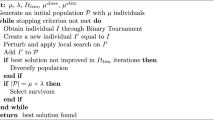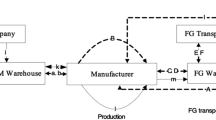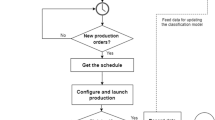Abstract
In today’s competitive world, each company which is involved in production activities should try to adjust its production scheduling with customers’ order. This reality was one of the principals of emerging just-in-time philosophy which tries to fulfill each customer’s order in exact size of his demand and at the earliest time which is preferred by him. This is the main reason why those industries which produce high variety of goods have been trying to change their production policy from batch production of a single type to batch production mixed of different types which is called minimal part set. With this motivation, cyclic policy which also attempts to reduce work-in-process inventory arouse in production systems. Although hybrid flow shop is one of the most important and notable problems in sequencing and scheduling, there has not yet been any research that considers use of cyclic policy in hybrid flow shop. This problem is which this paper tries to peruse. Moreover, we try to reduce the gap between theoretical and practical problems by considering unrelated parallel machines, eligibility, and limited buffer constraints. In this paper, a mixed integer linear programming model is proposed at first. Because of the NP-hard nature of the problem, some heuristics and meta-heuristics are proposed for solving the problem and are compared then. At last, all the results show that a simulated annealing method using some embedded heuristics in it is an effective approach for solving this problem.
Similar content being viewed by others
References
Johnson SM (1954) Optimal two and three stage production schedules with setup times included. Naval Res Logist Q 1(1):61–68
Vignier A, Billaut JC, Proust C (1999) Les problFmes d’ordonnancement de type flow-shop hybride. RAIRO Recherche OpTrationnelle, pp 117–183
Kurz ME, Askin RG (2003) Comparing scheduling rules for flexible flow lines. Int J Prod Econ 85(3):371–388
Ruiz R, Maroto C (2006) A genetic algorithm for hybrid flowshops with sequence dependent setup times and machine eligibility. Eur J Oper Res 169(3):781–800
Sawik T (2000) Mixed integer programming for scheduling flexible flow lines with limited intermediate buffers. Math Comput Model 31(13):39–52
Kochhar S, Morris RJT (1987) Heuristic methods for flexible flow line scheduling. J Manuf Syst 6(4):299–314
Song JS, Lee TE (1998) Petri net modeling and scheduling for cyclic job shops with blocking. Comput Ind Eng 34(2):281–295
Karabati S, Kouvelis P (1996) Cyclic scheduling in flow lines: modeling observations, effective heuristics and a cycle time minimization procedure. Naval Res Logist (NRL) 43(2):211–231
Levner E, Kats V, López A, de Pablo D, Cheng TCE (2010) Complexity of cyclic scheduling problems: a state-of-the-art survey. Comput Ind Eng 59(2):352–361
Arthanari TS, Ramamurthy KG (1971) An extension of two machines sequencing problem. Opsearch 8(1):10–22
Salvador MS (1973). A solution to a special class of flow shop scheduling problems. In Symposium on the theory of scheduling and its applications, pp 83-91
Garey MR, Johnson DS (1979) Computers and intractability. A guide to the theory of NP-completeness. A Series of Books in the Mathematical Sciences
Linn R, Zhang W (1999) Hybrid flow shop scheduling: a survey. Comput Ind Eng 37(1–2):57–61
Ruiz R, Vazquez-Rodriguez JA (2010) The hybrid flow shop scheduling problem. Eur J Oper Res 205(1):1–18
Ribas I, Leisten R, Framiñan JM (2010) Review and classification of hybrid flow shop scheduling problems from a production system and a solutions procedure perspective. Comput Oper Res 37(8):1439–1454
Hayrinen T, Johnsson M, Johtela T, Smed J, Nevalainen O (2000) Scheduling algorithms for computer-aided line balancing in printed circuit board assembly. Prod Plan Control 11(5):497–510
Low C (2005) Simulated annealing heuristic for flow shop scheduling problems with unrelated parallel machines. Comput Oper Res 32(8):2013–2025
Jungwattanakit J, Reodecha M, Chaovalitwongse P, Werner F (2005) An evaluation of sequencing heuristics for flexible flowshop scheduling problems with unrelated parallel machines and dual criteria. Otto-von-Guericke-Universitat Magdeburg (Preprint) 28(05):1–23
Jungwattanakit J, Reodecha M, Chaovalitwongse P, Werner F (2008) Algorithms for flexible flow shop problems with unrelated parallel machines, setup times, and dual criteria. Int J Adv Manuf Technol 37(3):354–370
Jungwattanakit J, Reodecha M, Chaovalitwongse P, Werner F (2009) A comparison of scheduling algorithms for flexible flow shop problems with unrelated parallel machines, setup times, and dual criteria. Comput Oper Res 36(2):358–378
Ruiz R, Serifoglu FS, Urlings T (2008) Modeling realistic hybrid flexible flowshop scheduling problems. Comput Oper Res 35(4):1151–1175
Urlings T, Ruiz R, Stutzle T (2010) Shifting representation search for hybrid flexible flowline problems. Eur J Oper Res 207(2):1086–1095
Fanjul-Peyro L, Ruiz R (2012) Scheduling unrelated parallel machines with optional machines and job selection. Comput Oper Res 39:1745–1753
Gicquel C, Hege L, Minoux M, van Canneyt W (2012) A discrete time exact solution approach for a complex hybrid flow-shop scheduling problem with limited-wait constraints. Comput Oper Res 39:629–636
Costa A, Cappadonna FA, Fichera S (2013) A dual encoding-based meta-heuristic algorithm for solving a constrained hybrid flow shop scheduling problem. Comput Ind Eng 64:937–958
Elmi A, Topaloglu S (2013) A scheduling problem in blocking hybrid flow shop robotic cells with multiple robots. Comput Oper Res 40:2543–2555
Bozejko W, Pempera J, Smutnicki C (2013) Parallel tabu search algorithm for the hybrid flow shop problem. Comput Ind Eng 65:466–474
Cuninghame-Green RA (1960) Process synchronisation in a steelworks–a problem of feasibility. In Proceedings of the 2nd international conference on operational research, pp 323-328
Cuninghame-Green RA (1962) Describing industrial processes with interference and approximating their steady-state behaviour. OR:95-100
Wittrock RJ (1985) Scheduling algorithms for flexible flow lines. IBM J Res Dev 29(4):401–412
Hall NG (1999) Operations research techniques for robotic system planning, design, control and analysis. Handbook of Industrial Robotics, John Wiley, pp 543-577
Pinedo M (2008) Scheduling: theory, algorithms, and systems. Springer
Hanen C, Munier A (1995) Cyclic scheduling on parallel processors: an overview. Scheduling Theory and its Applications:194-226
Kats V, Levner E (2003) Polynomial algorithms for periodic scheduling of tasks on parallel processors. Pract Appl Parallel Comput: Adv Comput Theory Pract 12:363–370
Dawande M, Geismar HN, Sethi SP, Sriskandarajah C (2005) Sequencing and scheduling in robotic cells: recent developments. J Sched 8(5):387–426
Dawande MW, Geismar HN, Sethi SP (2007) Throughput optimization in robotic cells. Springer
McCormick ST, Rao US (1994) Some complexity results in cyclic scheduling. Math Comput Model 20(2):107–122
Levner E, Kats V, De Pablo DAL (2007) Cyclic scheduling in robotic cells: an extension of basic models in machine scheduling theory. Multiprocessor Sched 1
Graves SC, Meal HC, Stefek D, Zeghmi AH (1983) Scheduling of re-entrant flow shops. J Oper Manag 3(4):197–207
McCormick ST, Pinedo ML, Wolf B (1986), Sequencing in a flexible assembly line with blocking to minimize cycle time. In Proc. 2nd ORSA/TIMS Conf. on Flexible Manufacturing Systems, p. 499
McCormick ST, Pinedo ML, Shenker S, Wolf B (1989) Sequencing in an assembly line with blocking to minimize cycle time. Oper Res 37(6):925–935
Hanen C (1994) Study of a NP-hard cyclic scheduling problem: the recurrent job-shop. Eur J Oper Res 72(1):82–101
Kouvelis P, Karabati S (1999) Cyclic scheduling in synchronous production lines. IIE Trans 31(8):709–719
Crama Y, Kats V, Van de Klundert J, Levner E (2000) Cyclic scheduling in robotic flowshops. Ann Oper Res 96(1):97–124
Che A, Kats V, Levner E (2011) Cyclic scheduling in robotic flowshops with bounded work‐in‐process levels. Naval Res Logist (NRL) 58(1):1–16
Hanen C, Munier A (1995) A study of the cyclic scheduling problem on parallel processors. Discret Appl Math 57(2–3):167–192
Chrétienne P (1999) List schedules for cyclic scheduling. Discret Appl Math 94(1–3):141–159
Kampmeyer T (2006) Cyclic scheduling problems. PhD theses, University of Osnabruck, Germany
Nambiar AN (2007) Mathematical formulation and scheduling heuristics for cyclic permutation flow-shops. PhD dissertation, Ohio University
Brucker P, Kampmeyer T (2005) Tabu search algorithms for cyclic machine scheduling problems. J Sched 8(4):303–322
Hall NG, Kamoun H, Sriskandarajah C (1998) Scheduling in robotic cells: complexity and steady state analysis. Eur J Oper Res 109(1):43–65
Gupta JND, Tunc EA (1998) Minimizing tardy jobs in a two-stage hybrid flowshop. Int J Prod Res 36(9):2397–2417
Wardono B, Fathi Y (2004) A tabu search algorithm for the multi-stage parallel machine problem with limited buffer capacities. Eur J Oper Res 155(2):380–401
Yaurima V, Burtseva L, Tchernykh A (2009) Hybrid flowshop with unrelated machines, sequence-dependent setup time, availability constraints and limited buffers. Comput Ind Eng 56(4):1452–1463
Palmer DS (1965) Sequencing jobs through a multi-stage process in the minimum total time-a quick method of obtaining a near optimum. OR:101-107
Dannenbring DG (1977) An evaluation of flow shop sequencing heuristics. Manag Sci 23(11):1174–1182
Nawaz M, Enscore JEE, Ham I (1983) A heuristic algorithm for the m-machine, n-job flow-shop sequencing problem. Omega 11(1):91–95
Hsu T, Korbaa O, Dupas R, Goncalves G (2008) Cyclic scheduling for FMS: modelling and evolutionary solving approach. Eur J Oper Res 191(2):464–484
Author information
Authors and Affiliations
Corresponding author
Rights and permissions
About this article
Cite this article
Soltani, S.A., Karimi, B. Cyclic hybrid flow shop scheduling problem with limited buffers and machine eligibility constraints. Int J Adv Manuf Technol 76, 1739–1755 (2015). https://doi.org/10.1007/s00170-014-6343-0
Received:
Accepted:
Published:
Issue Date:
DOI: https://doi.org/10.1007/s00170-014-6343-0




